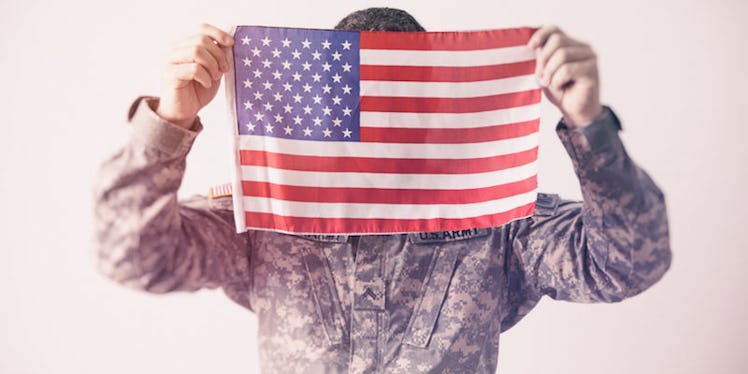
Why Comparing The Salaries Of Soldiers And Fast Food Workers Makes No Sense
Ever since McDonald's workers began striking for $15 an hour, I’ve seen a number of similar memes floating around social media.
On one side they depict a soldier, usually in a desert background or carrying a wounded comrade, and on the other is a McDonald's employee.
The accompanying text generally describes how soldiers only make some amount less than $15 an hour, so how could fast food workers really think they deserve more? The parting shot is usually a line like, “If you’ve chosen fast food as your career maybe you’ve make some wrong choices.”
Not only is this type of comparison unfair to both sides, but also leaves out many of the other benefits soldiers receive beyond their paycheck, including the respect of their fellow Americans.
It’s most grievous error is it sets at odds two groups of people who could benefit far more from working together.
The most important idea to get straight is why the McDonald's workers are striking in the first place: because it is impossible to live in this country while making $8.50 an hour.
It's not because they think they deserve more spending money or that their job is glorious and they should be rewarded for that. It's because they need to pay their bills and support their families, and it is incredibly hard to do that making minimum wage.
This is especially true when you only work part-time, as many workers at fast food companies do. Then you are required to work multiple part-time jobs just to make enough money to live.
When a person works 40 hours a week or more at multiple jobs for minimum wage, it leaves little time to gain experience or network to find a better paying job.
They don’t.
Increase that wage to $15, and even part-time workers gain the ability to improve their lives, as they don’t have to constantly be working in order to have one.
No one would say soldiers have it easy, or that they don’t deserve all the respect Americans give them.
They fight and die for our country every day. But that is the very same reason why they receive benefits above and beyond a simple paycheck.
According to GoArmy.com, if a soldier lives on an Army base, all housing and meals are paid for.
If a soldier has to live off base, the army gives them compensation every month for food, housing, childcare and other expenses, all of which a McDonald's worker would have to pay out of pocket.
If a new recruit sets aside $100 a month for his or her first year of service, he or she can access up to $60,000 worth of aid to attend college through the Montgomery GI Bill.
Therefore, if a newly recruited private worked a standard 40 hours a week, he would make minimum wage just like a McDonald's employee, but he also has the ability to tap into money and opportunities a fast food worker can only dream of.
Yes, a soldier will face dangers on the job a fast food worker never will, but based purely upon compensation, there is no comparison.
One huge thing soldiers have always gotten, which fast food workers never have, is respect. Even as people stand in line waiting to get a Big Mac or Baconator, they judge the people behind the counter.
It is a part of American culture that working at a fast food restaurant is what happens to the creeps and idiots of high school, who could never make it in college or with other people.
It's assumed McDonald's is a place for high school kids, not college graduates or parents.
Yet, the reality is, in the America of today, it’s hard to get a job that not only pays you enough to live, but also earns you respect. Even with a college degree, it has become increasingly difficult to get a “respectable” job.
I myself graduated from a highly respected college, yet have worked as a janitor at a photography studio while I trudge my way through unpaid internships to gain enough experience to get an entry-level job in my industry.
A person needs to live, eat and have a roof over his or her head and take care of his or her family. To do that, people need to make money.
Rather than using soldiers to put down fast food workers, perhaps it would benefit both groups far more if they banded together to demand wages that allow them to stop worrying about whether they’ll have enough to eat or pay rent.
If you don’t think fast food workers should make $15 per hour because soldiers don’t, perhaps the answer is raising wages for soldiers as well, instead of keeping everyone at an amount that isn’t sustainable.
It’s easy to put yourself in the shoes of a soldier and realize how much respect and compensation one may deserve, but next time you’re waiting in line for a burger and fries, think about standing over a burning hot grill and flipping patties for people who don’t respect you.
Think about worrying about whether you can pay the rent or support your family, or the possibility that you’ll never be able to afford college. You'll probably realize that’s a terrifying place to be in too.
That’s what these workers are striking for: an opportunity for a life free from those worries, a life with the possibility of achieving something better.